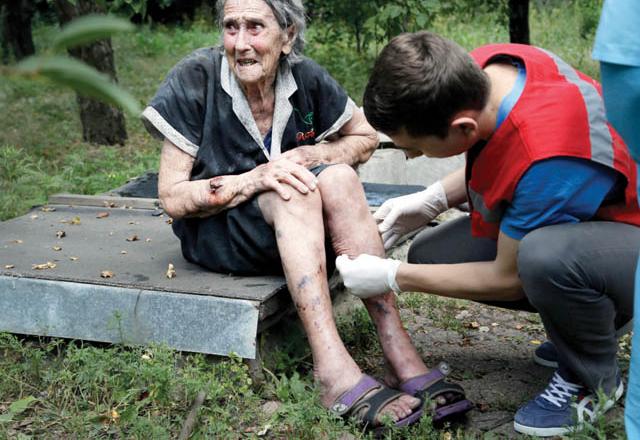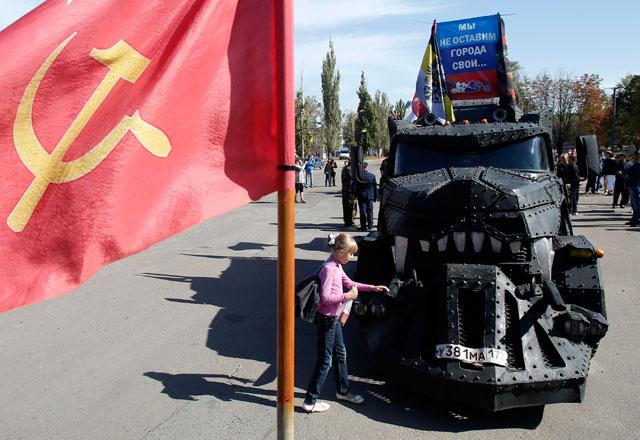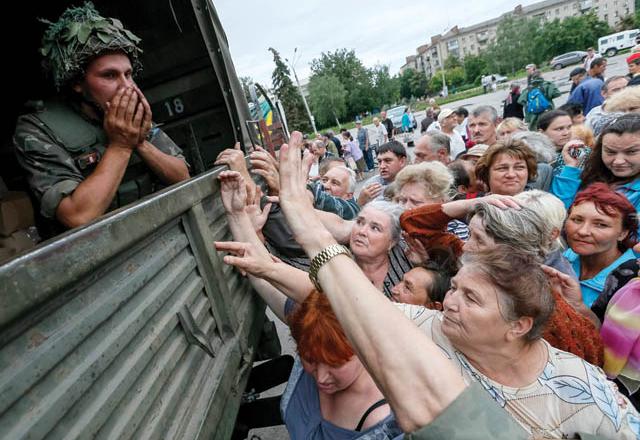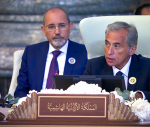You are here
Ukraine truce ‘largely holding’ but fears run deep
By AFP - Sep 06,2014 - Last updated at Sep 06,2014
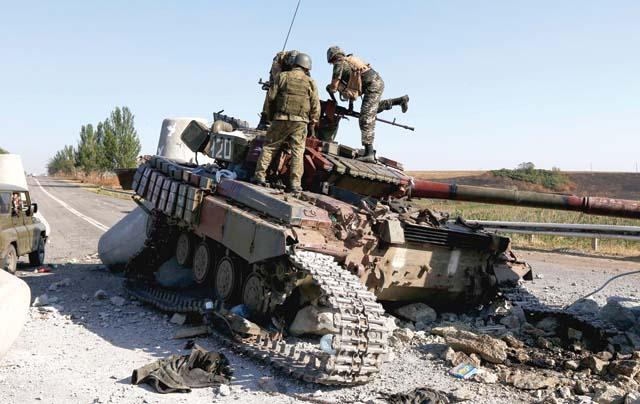
KIEV — Ukraine said Saturday a truce was largely holding in the war-battered east, despite fears it may ultimately fail to halt a pro-Russian insurgency still threatening to tear the country apart.
The 12-point pact signed on Friday is the first backed by both Kiev and Moscow to end a conflict which triggered the most serious crisis between Russia and the West since the Cold War.
But the separatists insist they will not give up their ambitions for an independent state in the industrial east, and weary local residents were doubtful the ceasefire would bring lasting peace to their devastated towns and cities.
The pro-Moscow rebels and the Ukrainian military had accused each other earlier Saturday of some breaches of the deal in the hours after it was signed in the Belarussian capital Minsk on Friday.
But Ukrainian President Petro Poroshenko said Saturday that he and Russian leader Vladimir Putin had agreed in a phone call that it "was generally being observed".
Suspicious of Putin
Western leaders remain deeply suspicious of Putin's true intentions after accusing him of actively fomenting the rebellion by funnelling large numbers of troops and heavy weaponry across the border, claims Moscow has repeatedly denied.
Despite the ceasefire, the US and the EU agreed to beef up sanctions against Moscow and NATO approved a rapid reaction force aimed at reassuring jittery Eastern European states.
Russia warned it would respond if the EU imposes more sanctions, accusing Brussels of supporting the “party of war” in Kiev.
Nearly 2,800 people have been killed since April, according to AFP calculations, when Kiev launched a huge offensive against Russian-speaking militiamen who had seized a string of towns and cities across Ukraine’s vital coal and steel belt in the chaotic aftermath of Moscow’s annexation of Crimea.
Full details of the Minsk accord have not been disclosed although some of the terms call for both sides to start pulling back from major flashpoints and exchanging prisoners from Saturday.
Russia is also being allowed to supply stricken cities with humanitarian aid that Kiev had previously opposed out of fear the convoys could be used to smuggle arms.
However, there was no indication if any of the articles had yet been implemented on the ground.
Poroshenko has said he was “satisfied” with the agreement.
But it exposes him to charges of signing off on his government’s surrender and failing on his May election promise to reunify the nation of 45 million under a single banner of building strong ties with the West.
The truce was drawn up after a dramatic spiral in tensions when the rebels, reportedly backed by Russian troops, launched a lightning counter-offensive across the southeast that turned the tide of the conflict against the Ukrainian army.
It could leave the separatists — who remain deeply mistrustful of the nationalist-leaning government in Kiev — in effective control of a region that accounts for one-sixth of Ukraine’s population and a quarter of its exports.
Rebel Donetsk Parliament Speaker Boris Litvinov insisted that the ceasefire did not mean fighters had given up on the goal of establishing their own state with binding diplomatic and trade ties to Russia.
“We want our own president, our own currency and our own banking system,” a pro-Russian guerrilla named Oleg told AFP in the Donetsk region town of Yasynuvata.
“This is the only way. There is no other alternative.”
And in some of the flashpoint cities, locals were pessimistic after a unilateral Kiev ceasefire in June collapsed just after a few days.
‘They are bandits’
The months of fighting have left dozens of towns in the east in ruins and once-powerful factories and coalmines that form the backbone of Ukraine’s economy have ground to a halt.
“It’s impossible to trust them [the rebels], they are bandits,” said Natalia, a 54-year-old professor staying with friends in the port city of Mariupol after fleeing Donetsk.
Ukrainian Prime Minister Arseniy Yatsenyuk said the agreement required US and EU guarantees because Kiev could “not manage with Russia on our own”.
Outgoing NATO chief Anders Fogh Rasmussen, announcing the agreement among members for a rapid reaction force at the alliance’s summit in Wales, described the Ukraine crisis as a “wake-up call”.
“This decision sends a clear message — NATO protects all allies at all times,” he said.
But despite its strong words against Moscow, Washington appears to have little appetite to become directly involved in ensuring the peace.
“This obviously is a ceasefire that has to be held between Russia and Ukraine,” State Department spokeswoman Marie Harf said.
“This isn’t about the United States; this is about them.”
Moscow has vowed to fight back against the punitive Western sanctions, accusing NATO of concocting evidence about its role in Ukraine as a pretext for expanding its own presence along Russia’s western frontier.
“Instead of feverishly searching for ways to hurt the economies of its own countries and Russia, the European Union would do better to work on supporting the economic revival of the Donbass region” of eastern Ukraine, the foreign ministry said Saturday.
Related Articles
Ukraine’s army shelled the main rebel bastion of Donetsk Sunday as Russia called for a humanitarian ceasefire, which the West warned could be a pretext by Moscow to send in troops.
Heavy fighting erupted around the rebel stronghold of Donetsk in eastern Ukraine on Sunday, piling further pressure on a precarious nine-day-old truce between the government and separatist fighters.
Resurgent Ukrainian forces on Sunday pursued retreating pro-Russian rebels after seizing their symbolic bastion in a morale-boosting win that appeared to dim hopes for a ceasefire in the bloody separatist insurgency.


